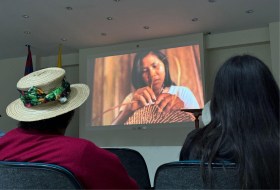News
Indigenous audiovisual projects shone at the traveling FESTVIC exhibition at Unicauca.
An itinerant exhibition featuring a selection of productions from the Indigenous Video Festival of the Regional Indigenous Council of Cauca (FESTVIC) took place in the Main Hall of the Faculty of Natural, Exact, and Educational Sciences at the University of Cauca on October 8 and 9, 2024
The narratives, sensitivities, and forms of expression of a group of indigenous audiovisual creators from the department of Cauca were showcased in an itinerant exhibition of the Indigenous Video Festival of the Regional Indigenous Council of Cauca (FESTVIC). The exhibition took place in the afternoon on October 8 and 9, 2024, in the Main Hall of the Faculty of Natural, Exact, and Educational Sciences at the University of Cauca.
On October 8, the first day of the exhibition, it was opened with words from Mayor Harold Secue, coordinator of the Communications Program of the Regional Indigenous Council of Cauca (CRIC), who introduced several episodes of the miniseries "Respira Amazonía," which focuses on highlighting the importance of this region for life in Colombia and the world, promoting actions that respect and protect the environment. Following that, indigenous communicators Vanessa Teteye and Cindy Amalec, from the media outlet Agenda Propia and participants in the miniseries, held a gender-focused conversation titled ‘La amazonía es mujer,’ moderated by Oscar Potes, a professor in the Social Communication program at Unicauca.

Provided photo
The next project featured was the episode titled “Pasos que no siguen huella” from the fifth season of the documentary series "Autonomías Territoriales," an audiovisual production by the Regional Indigenous Council of Cauca (CRIC), which addresses various processes of disharmony in the territories where this organization is present. The showcase concluded with a conversation involving Yuli Guanga, director of this production, Danilo Fernández, the current director of the sixth season of "Autonomías Territoriales," and Oscar Potes, aimed at discussing the challenges of teamwork, the roles performed, and the journey of the series since 2019.
On the following day, October 9, the exhibition began with the episode “Sanar sanando,” also from the documentary series "Autonomías Territoriales," followed by a discussion featuring Adriana Piso, the episode's protagonist, Yuli Guanga from the production "Autonomías Territoriales," Eliana Guetio from the sixth season of "Autonomías Territoriales," and Oscar Potes, a professor in the Social Communication program. They held a poignant conversation addressing various topics such as mental health, family, and the struggles of diverse populations.

Provided photo
Once this discussion concluded, the program continued with the presentation of the documentary “Voces protectoras del territorio,” created by the Women’s Program of the Regional Indigenous Council of Cauca (CRIC), an interesting audiovisual piece that reflects part of the life and work of the women in the Indigenous Guard. Finally, the event concluded with a musical performance by the chirimía Tamborá, who wrapped up the space with a splendid closing.
This itinerant exhibition served as an audiovisual journey that invited the audience to reflect on various environmental, social, cultural, and political situations within indigenous communities. By bringing these stories to the screen, the goal is to raise awareness, inspiring the construction of a future where identity and cultural diversity are valued and protected, and where more stories produced and led by our peoples can be seen and celebrated. At the University of Cauca, we are excited to host these spaces that highlight the audiovisual processes driven by organizations like the Regional Indigenous Council of Cauca, supporting not only the talent and dreams of young creators but also showcasing the realities of our communities in the territories.
Written by: Juan José Londoño Hernández


